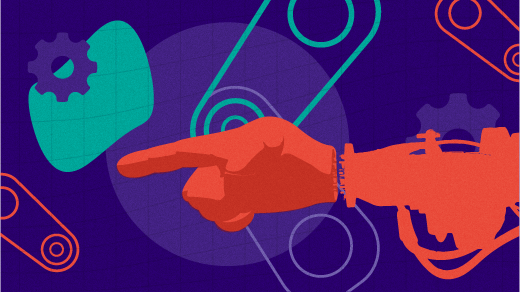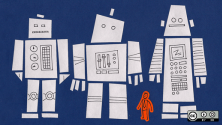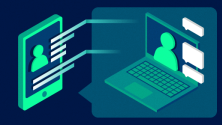Without question, 2018 was a big year for artificial intelligence (AI) as it pushed even further into the mainstream, successfully automating more functionality than ever before. Companies are increasingly exploring applications for AI, and the general public has grown accustomed to interacting with the technology on a daily basis.
The stage is set for AI to continue transforming the world as we know it. In 2019, not only will the technology continue growing in global prevalence, but it will also spawn deeper conversations around important topics, fuel innovative business models, and impact society in new ways, including the following seven.
1. Machine learning as a service (MLaaS) will be deployed more broadly
In 2018, we witnessed major strides in MLaaS with technology powerhouses like Google, Microsoft, and Amazon leading the way. Prebuilt machine learning solutions and capabilities are becoming more attractive in the market, especially to smaller companies that don't have the necessary in-house resources or talent. For those that have the technical know-how and experience, there is a significant opportunity to sell and deploy packaged solutions that can be easily implemented by others.
Today, MLaaS is sold primarily on a subscription or usage basis by cloud-computing providers. For example, Microsoft Azure's ML Studio provides developers with a drag-and-drop environment to develop powerful machine learning models. Google Cloud's Machine Learning Engine also helps developers build large, sophisticated algorithms for a variety of applications. In 2017, Amazon jumped into the realm of AI and launched Amazon SageMaker, another platform that developers can use to build, train, and deploy custom machine learning models.
In 2019 and beyond, be prepared to see MLaaS offered on a much broader scale. Transparency Market Research predicts it will grow to US$20 billion at an alarming 40% CAGR by 2025.
2. More explainable or "transparent" AI will be developed
Although there are already many examples of how AI is impacting our world, explaining the outputs and rationale of complex machine learning models remains a challenge.
Unfortunately, AI continues to carry the "black box" burden, posing a significant limitation in situations where humans want to understand the rationale behind AI-supported decision making.
AI democratization has been led by a plethora of open source tools and libraries, such as Scikit Learn, TensorFlow, PyTorch, and more. The open source community will lead the charge to build explainable, or "transparent," AI that can clearly document its logic, expose biases in data sets, and provide answers to follow-up questions.
Before AI is widely adopted, humans need to know that the technology can perform effectively and explain its reasoning under any circumstance.
3. AI will impact the global political landscape
In 2019, AI will play a bigger role on the global stage, impacting relationships between international superpowers that are investing in the technology. Early adopters of AI, such as the US and China, will struggle to balance self-interest with collaborative R&D. Countries that have AI talent and machine learning capabilities will experience tremendous growth in areas like predictive analytics, creating a wider global technology gap.
Additionally, more conversations will take place around the ethical use of AI. Naturally, different countries will approach this topic differently, which will affect political relationships. Overall, AI's impact will be small relative to other international issues, but more noticeable than before.
4. AI will create more jobs than it eliminates
Over the long term, many jobs will be eliminated as a result of AI-enabled automation. Roles characterized by repetitive, manual tasks are being outsourced to AI more and more every day. However, in 2019, AI will create more jobs than it replaces.
Rather than eliminating the need for humans entirely, AI is augmenting existing systems and processes. As a result, a new type of role is emerging. Humans are needed to support AI implementation and oversee its application. Next year, more manual labor will transition to management-type jobs that work alongside AI, a trend that will continue to 2020. Gartner predicts that in two years, AI will create 2.3 million jobs while only eliminating 1.8 million.
5. AI assistants will become more pervasive and useful
AI assistants are nothing new to the modern world. Apple's Siri and Amazon's Alexa have been supporting humans on the road and in their homes for years. In 2019, we will see AI assistants continue to grow in their sophistication and capabilities. As they collect more behavioral data, AI assistants will become better at responding to requests and completing tasks. With advances in natural language processing and speech recognition, humans will have smoother and more useful interactions with AI assistants.
In 2018, we saw companies launch promising new AI assistants. Recently, Google began rolling out its voice-enabled reservation booking service, Duplex, which can call and book appointments on behalf of users. Technology company X.ai has built two AI personal assistants, Amy and Andrew, who can interact with humans and schedule meetings for their employers. Amazon also recently announced Echo Auto, a device that enables drivers to integrate Alexa into their vehicles. However, humans will continue to place expectations ahead of reality and be disappointed at the technology's limitations.
6. AI/ML governance will gain importance
With so many companies investing in AI, much more energy will be put towards developing effective AI governance structures. Frameworks are needed to guide data collection and management, appropriate AI use, and ethical applications. Successful and appropriate AI use involves many different stakeholders, highlighting the need for reliable and consistent governing bodies.
In 2019, more organizations will create governance structures and more clearly define how AI progress and implementation are managed. Given the current gap in explainability, these structures will be tremendously important as humans continue to turn to AI to support decision-making.
7. AI will help companies solve AI talent shortages
A shortage of AI and machine learning talent is creating an innovation bottleneck. A survey released last year from O'Reilly revealed that the biggest challenge companies are facing related to using AI is a lack of available talent. And as technological advancement continues to accelerate, it is becoming harder for companies to develop talent that can lead large-scale enterprise AI efforts.
To combat this, organizations will—ironically—use AI and machine learning to help address the talent gap in 2019. For example, Google Cloud's AutoML includes machine learning products that help developers train machine learning models without having any prior AI coding experience. Amazon Personalize is another machine learning service that helps developers build sophisticated personalization systems that can be implemented in many ways by different kinds of companies. In addition, companies will use AI to find talent and fill job vacancies and propel innovation forward.
AI In 2019: bigger and better with a tighter leash
Over the next year, AI will grow more prevalent and powerful than ever. Expect to see new applications and challenges and be ready for an increased emphasis on checks and balances.
What do you think? How might AI impact the world in 2019? Please share your thoughts in the comments below!







4 Comments